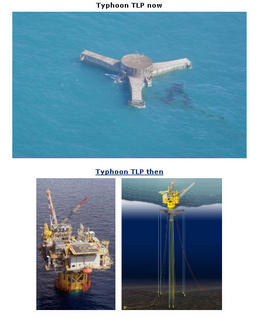The Backup Plan
Posted by Big Gav
Technology Review has an interesting little article on a hydrogen fuel cell company that set out to make that holy grail of the "smart grid" future - an affordable energy storage device that can fit into a house or a car. They failed, but they are making slowly making progress by taking a different tack.
Of course, that still leaves the "how to cheaply and sustainably create hydrogen" problem, but there are a few semi-promising methods around.
 BHP Billiton did an interesting presentation on the effects of the hurricanes on their Gulf of Mexico projects - Typhoon may be abandoned and Atalantis and Mad Dog are delayed. Global warming one, BHP nill.
BHP Billiton did an interesting presentation on the effects of the hurricanes on their Gulf of Mexico projects - Typhoon may be abandoned and Atalantis and Mad Dog are delayed. Global warming one, BHP nill.Anglo-Australian resources group BHP Billiton has warned that fallout from the ferocious hurricanes in the Gulf of Mexico earlier this year could delay the startup of its US$1.1 billion Atlantis oil and gas development, the Australian Financial Review reported Monday.
The newspaper said Phil Aiken, head of the group's petroleum division, told sell-side analysts at a briefing Friday that hurricanes Rita and Katrina resulted in equipment and personnel delays for the project, which had been scheduled to start in the third quarter of 2006. He told investors he remains confident that startup will occur on schedule, but many in the market expect the delays will put the project's startup date back by up to six months, prompting a series of downgrades to earnings and production estimates.
The Australian Financial Review also said Aiken indicated the potential for a write-off of the Typhoon oil platform, operated by Chevron, which was severely damaged in the storms.
He also said the ramp-up of the group's Mad Dog project has been delayed by around three months due to the failure of one of the wells, which has to be redrilled, while approval for its Shenzi project has slipped to the first quarter of 2006 as the company reassesses the tension-leg platform technology that was used in the Typhoon platform.
Hurricane season should be over, though records still keep getting broken - WorldChanging has a little note on the mysterious Hurricane Epsilon.
In other BHP news, they have announced a big increase in their Bass Strait gas reserves.
Gas reserves at the Bass Strait operations of BHP Billiton and Esso Australia Resources have been boosted by 700 billion cubic feet, further extending the life of the long-running project. The new find adds to the estimated six trillion cubic feet of gas remaining at the Gippsland Basin joint venture.
The extra gas can be extracted and transferred by the joint venture's existing infrastructure in Bass Strait, which includes 21 offshore platforms. The 50/50 joint venture between the world's biggest miner and the petroleum giant has dominated Bass Strait oil and gas for 40 years. Since the pair began operations in 1966 they have extracted about five trillion cubic feet of gas.
I once read a Credit Suisse First Boston report on global warming that kicked off with the analyst wondering where he would go skiing when Europe's glaciers had disappeared (he was obviously assuming that the Gulf stream wouldn't fail, in which case lack of snow wouldn't be the problem). WorldChanging has a short post up on "A World Without Snow".
One of the many troubling aspects of global warming is the possibility of feedback effects, where changes resulting from a warming atmosphere serve to further exacerbate the warming. An example of how this could work is the interaction between warming and snow cover. According to Stephan Vavrus at the Unversity of Wisconsin-Madison's Center for Climate Research, if global warming manages to melt off the current snow cover in the far north -- a distinct possibility -- the result would be a further increase in temperature of close to another degree (which would, in turn, further accelerate other effects of temperature increases).
The snow itself does more than reflect the sun's heat; it also serves as insulation for the ground, so that snow-covered soil is warmer than it would be otherwise. As a result, regions now covered in snow would instead see an expansion of permafrost, with resulting damage to structures and roadways in places like Alaska. Of course, as temperatures continue to climb, even that permafrost won't be so permanent...





